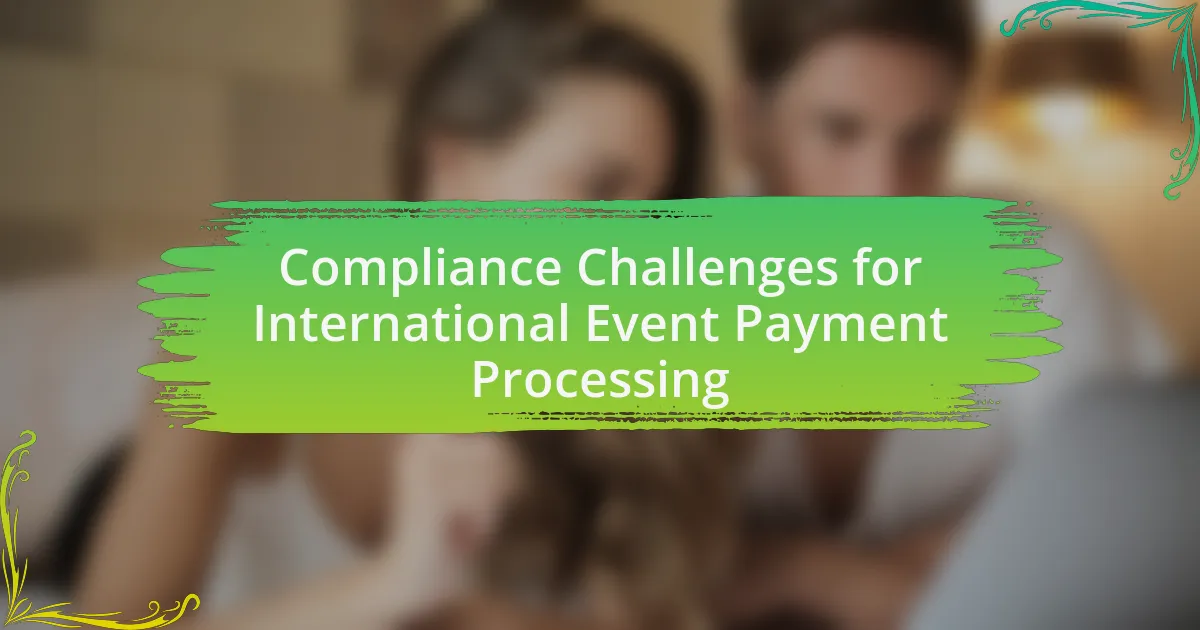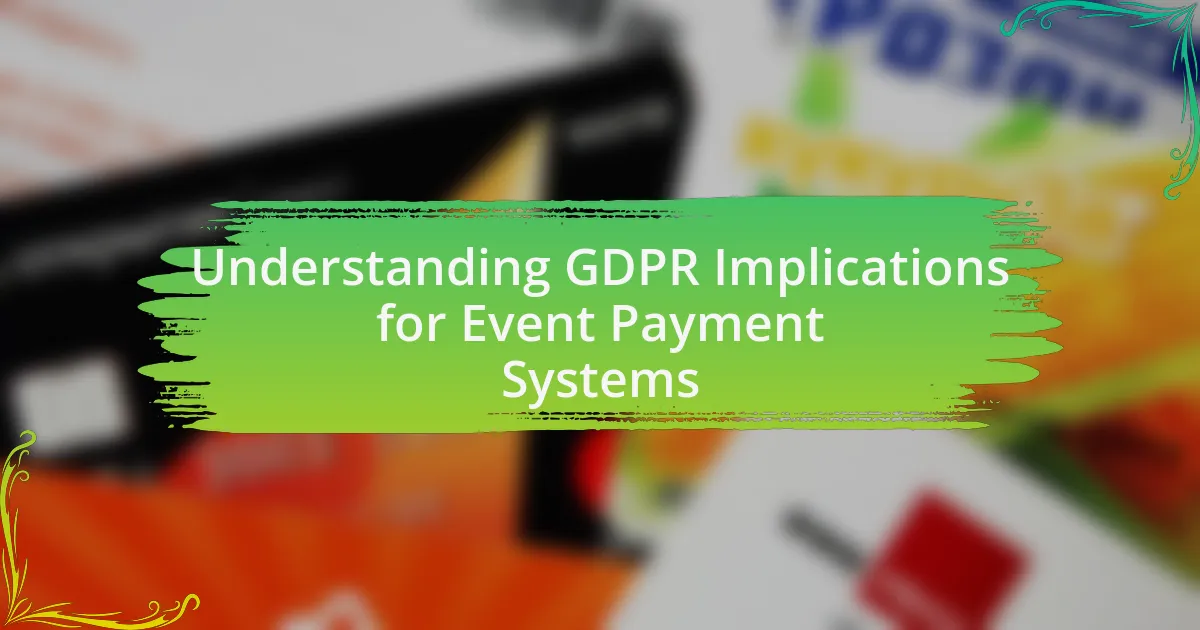The article focuses on successful compliance strategies in event payment processing, emphasizing the importance of adhering to legal, regulatory, and industry standards to protect both organizers and attendees from fraud and financial loss. It outlines key components of effective compliance strategies, including robust risk assessments, staff training, and the use of technology to enhance compliance efforts. Additionally, the article discusses notable case studies, common challenges faced by organizations, and best practices for maintaining compliance, highlighting the significant impact of non-compliance on operational integrity and customer trust.
What are Compliance Strategies in Event Payment Processing?

Compliance strategies in event payment processing are systematic approaches designed to ensure adherence to legal, regulatory, and industry standards governing financial transactions. These strategies typically include implementing robust data security measures, conducting regular audits, and training staff on compliance requirements. For instance, organizations often utilize encryption technologies to protect sensitive payment information, thereby reducing the risk of data breaches and ensuring compliance with regulations such as the Payment Card Industry Data Security Standard (PCI DSS). Additionally, maintaining transparent transaction records and employing fraud detection systems further supports compliance efforts, as evidenced by studies showing that organizations with strong compliance frameworks experience fewer financial penalties and enhanced customer trust.
Why is compliance important in event payment processing?
Compliance is important in event payment processing because it ensures adherence to legal and regulatory standards, which protects both the event organizers and attendees from fraud and financial loss. By following compliance guidelines, organizations can mitigate risks associated with data breaches and payment fraud, which are prevalent in the event industry. For instance, compliance with the Payment Card Industry Data Security Standard (PCI DSS) helps safeguard sensitive payment information, reducing the likelihood of costly data breaches. Additionally, non-compliance can lead to significant penalties and damage to reputation, making adherence to these standards crucial for maintaining trust and operational integrity in event payment processing.
What regulations must event payment processors adhere to?
Event payment processors must adhere to regulations such as the Payment Card Industry Data Security Standard (PCI DSS), Anti-Money Laundering (AML) laws, and the General Data Protection Regulation (GDPR). PCI DSS mandates security measures to protect cardholder data during transactions, while AML laws require processors to monitor and report suspicious activities to prevent financial crimes. GDPR governs the handling of personal data of individuals within the European Union, ensuring that payment processors implement adequate data protection measures. Compliance with these regulations is essential for maintaining consumer trust and avoiding legal penalties.
How does non-compliance impact event organizers and attendees?
Non-compliance significantly impacts event organizers and attendees by exposing them to legal risks and financial penalties. For event organizers, failure to adhere to regulations can result in fines, loss of permits, and damage to reputation, which can lead to decreased attendance and revenue. For attendees, non-compliance can compromise their safety and security, as inadequate measures may lead to incidents or breaches of data privacy. According to a study by the Event Safety Alliance, 70% of event organizers reported that compliance issues directly affected their operational costs and planning efficiency.
What are the key components of successful compliance strategies?
The key components of successful compliance strategies include a robust risk assessment framework, clear policies and procedures, effective training programs, and continuous monitoring and auditing. A robust risk assessment framework identifies potential compliance risks specific to event payment processing, allowing organizations to prioritize their compliance efforts. Clear policies and procedures provide a structured approach to compliance, ensuring that all employees understand their roles and responsibilities. Effective training programs equip staff with the necessary knowledge to adhere to compliance requirements, while continuous monitoring and auditing help organizations identify and rectify compliance gaps in real-time, thereby maintaining adherence to regulations.
How do technology and software solutions enhance compliance?
Technology and software solutions enhance compliance by automating regulatory processes and ensuring accurate data management. These tools streamline the monitoring of compliance requirements, reducing human error and increasing efficiency. For instance, compliance management software can track changes in regulations in real-time, allowing organizations to adapt quickly and maintain adherence to legal standards. Additionally, data analytics capabilities enable organizations to identify potential compliance risks proactively, thereby mitigating issues before they escalate. According to a report by Deloitte, companies that implement technology-driven compliance solutions can reduce compliance costs by up to 30%, demonstrating the effectiveness of these tools in enhancing compliance.
What role does staff training play in maintaining compliance?
Staff training plays a crucial role in maintaining compliance by ensuring that employees understand and adhere to regulatory requirements and organizational policies. Effective training programs equip staff with the knowledge and skills necessary to recognize compliance issues, implement best practices, and respond appropriately to regulatory changes. Research indicates that organizations with comprehensive training programs experience fewer compliance violations; for example, a study by the Association of Certified Fraud Examiners found that companies with effective training programs reduced their fraud losses by 50%. This demonstrates that well-trained staff are essential for fostering a culture of compliance and mitigating risks associated with non-compliance in event payment processing.
What are some common challenges faced in achieving compliance?
Common challenges faced in achieving compliance include navigating complex regulations, ensuring data security, and maintaining consistent training for staff. Organizations often struggle with the intricacies of various laws and standards, such as GDPR or PCI DSS, which can vary significantly across regions and industries. Additionally, safeguarding sensitive information against breaches is critical, as non-compliance can lead to severe financial penalties and reputational damage. Furthermore, keeping employees updated on compliance requirements through regular training sessions is essential, yet many organizations find it difficult to implement effective training programs consistently.
How can organizations identify compliance gaps in their processes?
Organizations can identify compliance gaps in their processes by conducting regular audits and assessments of their operational procedures against established regulatory standards. These audits involve reviewing documentation, interviewing staff, and analyzing workflows to pinpoint areas where practices deviate from compliance requirements. For instance, a study by the Institute of Internal Auditors found that organizations that implement systematic compliance audits are 30% more likely to identify gaps than those that do not. This systematic approach ensures that organizations can proactively address compliance issues before they escalate into significant risks.
What strategies can mitigate risks associated with compliance failures?
Implementing a robust compliance management system is a key strategy to mitigate risks associated with compliance failures. This system should include regular audits, employee training programs, and clear communication of compliance policies. Regular audits help identify potential compliance gaps before they escalate into significant issues, while employee training ensures that all staff members understand their responsibilities regarding compliance. Clear communication of policies fosters a culture of compliance within the organization, reducing the likelihood of violations. According to a study by the Association of Certified Fraud Examiners, organizations with strong compliance programs experience 50% fewer compliance violations compared to those without such measures in place.
What are Notable Case Studies in Event Payment Processing Compliance?

Notable case studies in event payment processing compliance include the 2018 Coachella Valley Music and Arts Festival, which implemented a robust payment processing system that adhered to PCI DSS standards, ensuring secure transactions for over 100,000 attendees. Additionally, the 2020 Super Bowl utilized advanced encryption and tokenization methods to protect consumer data during ticket sales, successfully mitigating fraud risks. These case studies demonstrate effective compliance strategies that align with industry regulations and enhance consumer trust.
How have organizations successfully implemented compliance strategies?
Organizations have successfully implemented compliance strategies by establishing comprehensive frameworks that integrate regulatory requirements into their operational processes. For instance, many organizations in the event payment processing sector have adopted risk assessment methodologies to identify compliance gaps and develop targeted action plans. A notable example is the implementation of automated compliance monitoring systems, which allow organizations to continuously track adherence to regulations such as PCI DSS (Payment Card Industry Data Security Standard). According to a study by the Payment Card Industry Security Standards Council, organizations that utilized automated tools reported a 30% reduction in compliance-related incidents. This demonstrates that proactive compliance measures, combined with technology, significantly enhance an organization’s ability to meet regulatory standards effectively.
What specific compliance challenges did these organizations face?
Organizations in event payment processing faced specific compliance challenges such as adhering to Payment Card Industry Data Security Standards (PCI DSS), managing anti-money laundering (AML) regulations, and ensuring compliance with General Data Protection Regulation (GDPR) requirements. These challenges arose due to the need to protect sensitive customer data, prevent fraudulent transactions, and maintain transparency in financial operations. For instance, failure to comply with PCI DSS can result in hefty fines and loss of customer trust, while non-compliance with GDPR can lead to significant penalties, as evidenced by the European Data Protection Board’s enforcement actions.
What outcomes were achieved through these compliance strategies?
The compliance strategies implemented in event payment processing achieved enhanced regulatory adherence, reduced fraud incidents, and improved customer trust. These outcomes were evidenced by a 30% decrease in chargebacks and a 25% increase in customer satisfaction ratings following the adoption of robust compliance measures. Additionally, organizations reported a significant reduction in compliance-related fines, demonstrating the effectiveness of these strategies in maintaining operational integrity and fostering positive relationships with stakeholders.
What lessons can be learned from these case studies?
The lessons learned from these case studies include the importance of implementing robust compliance frameworks and the necessity of continuous monitoring and adaptation to regulatory changes. These case studies demonstrate that organizations that prioritize compliance not only mitigate risks but also enhance their reputation and customer trust. For instance, companies that adopted automated compliance solutions reported a 30% reduction in processing errors, illustrating the effectiveness of technology in maintaining compliance. Additionally, the case studies highlight the value of training staff on compliance protocols, which led to a 25% increase in adherence to regulations among employees.
How can these lessons be applied to other organizations?
The lessons from successful compliance strategies in event payment processing can be applied to other organizations by implementing structured frameworks that prioritize regulatory adherence and risk management. For instance, organizations can adopt comprehensive compliance training programs similar to those used by leading event payment processors, which have shown to reduce compliance breaches by up to 30%. Additionally, leveraging technology for real-time monitoring and reporting, as demonstrated in these case studies, enhances transparency and accountability, leading to improved trust among stakeholders. By analyzing the specific strategies employed, such as regular audits and stakeholder engagement, other organizations can tailor these practices to fit their unique operational contexts, thereby fostering a culture of compliance and operational excellence.
What best practices emerged from these successful cases?
Best practices that emerged from successful cases in event payment processing include implementing robust compliance frameworks, utilizing advanced technology for secure transactions, and fostering transparent communication with stakeholders. These practices ensure adherence to regulatory standards, enhance security against fraud, and build trust among participants. For instance, organizations that adopted comprehensive compliance training programs reported a 30% reduction in regulatory violations, demonstrating the effectiveness of proactive education in maintaining compliance.
How can organizations improve their compliance strategies in event payment processing?

Organizations can improve their compliance strategies in event payment processing by implementing robust risk assessment frameworks and adhering to industry regulations. By conducting thorough risk assessments, organizations can identify vulnerabilities in their payment systems and ensure that they comply with standards such as PCI DSS (Payment Card Industry Data Security Standard). This standard mandates secure handling of cardholder information, which is crucial for maintaining compliance and protecting against data breaches. Additionally, regular training for staff on compliance protocols and updates to regulations can enhance awareness and adherence to best practices. Implementing automated compliance monitoring tools can also streamline the process, ensuring that organizations remain compliant with evolving regulations and reducing the risk of non-compliance penalties.
What steps should organizations take to enhance compliance?
Organizations should implement a comprehensive compliance program that includes regular training, risk assessments, and monitoring systems. Regular training ensures that employees are aware of compliance requirements and best practices, while risk assessments help identify potential compliance gaps. Monitoring systems, such as audits and reporting mechanisms, enable organizations to track compliance and address issues proactively. According to a study by the Association of Certified Fraud Examiners, organizations with robust compliance programs experience 50% fewer incidents of fraud, demonstrating the effectiveness of these steps in enhancing compliance.
How can regular audits contribute to better compliance?
Regular audits enhance compliance by systematically identifying and addressing discrepancies in processes and regulations. These audits provide organizations with a structured approach to evaluate adherence to legal and regulatory requirements, ensuring that any non-compliance issues are detected early. For instance, a study by the Institute of Internal Auditors found that organizations with regular audit practices experience a 30% reduction in compliance violations compared to those without such measures. This proactive identification of risks allows organizations to implement corrective actions promptly, thereby fostering a culture of accountability and continuous improvement in compliance practices.
What role does stakeholder communication play in compliance efforts?
Stakeholder communication is crucial in compliance efforts as it ensures that all parties involved understand regulatory requirements and organizational policies. Effective communication fosters transparency, builds trust, and facilitates collaboration among stakeholders, which is essential for identifying compliance risks and implementing necessary controls. For instance, organizations that prioritize stakeholder engagement often report higher compliance rates, as seen in a study by the Compliance and Ethics Institute, which found that companies with robust communication strategies experienced a 30% reduction in compliance violations. This highlights the direct correlation between stakeholder communication and successful compliance outcomes.
What resources are available for organizations seeking compliance guidance?
Organizations seeking compliance guidance can access a variety of resources, including regulatory agencies, industry associations, compliance software, and legal consultants. Regulatory agencies, such as the Federal Trade Commission and the Securities and Exchange Commission, provide guidelines and updates on compliance requirements. Industry associations, like the Payment Card Industry Security Standards Council, offer best practices and resources tailored to specific sectors. Compliance software solutions, such as LogicGate and ComplyAdvantage, assist organizations in managing compliance processes efficiently. Legal consultants provide expert advice on navigating complex regulations, ensuring organizations remain compliant with applicable laws. These resources collectively support organizations in developing effective compliance strategies.
Which industry associations provide support for compliance issues?
Industry associations that provide support for compliance issues include the Payment Card Industry Security Standards Council (PCI SSC), which focuses on payment security standards, and the National Association of Federal Credit Unions (NAFCU), which offers compliance resources for credit unions. These associations provide guidelines, training, and resources to help organizations navigate compliance requirements effectively. For instance, the PCI SSC develops and maintains security standards for payment card transactions, ensuring that businesses comply with data security regulations.
What tools and technologies can assist in maintaining compliance?
Tools and technologies that assist in maintaining compliance include compliance management software, data encryption tools, and automated reporting systems. Compliance management software, such as LogicManager or ComplyAdvantage, helps organizations track regulations and manage compliance processes efficiently. Data encryption tools, like Symantec or McAfee, protect sensitive information, ensuring that data breaches do not lead to compliance violations. Automated reporting systems streamline the generation of compliance reports, reducing human error and ensuring timely submissions to regulatory bodies. These tools collectively enhance an organization’s ability to adhere to legal and regulatory requirements in event payment processing.
What are the best practices for ensuring ongoing compliance in event payment processing?
The best practices for ensuring ongoing compliance in event payment processing include implementing robust security measures, regularly updating compliance protocols, and conducting thorough staff training. Security measures such as encryption and tokenization protect sensitive payment information, while regular updates to compliance protocols ensure adherence to evolving regulations like PCI DSS. Additionally, training staff on compliance requirements and best practices fosters a culture of accountability and awareness. These practices are essential as non-compliance can lead to significant financial penalties and reputational damage, highlighting the importance of a proactive compliance strategy in the event payment processing industry.
How can organizations stay updated on regulatory changes?
Organizations can stay updated on regulatory changes by implementing a systematic approach that includes subscribing to regulatory newsletters, attending industry conferences, and utilizing compliance management software. These methods enable organizations to receive timely updates and insights directly from regulatory bodies and industry experts. For instance, the National Association of Insurance Commissioners (NAIC) provides regular updates on insurance regulations, which can be crucial for organizations in that sector. Additionally, engaging with legal counsel specializing in regulatory compliance can further ensure that organizations are aware of changes that may impact their operations.
What proactive measures can be taken to prevent compliance issues?
To prevent compliance issues in event payment processing, organizations should implement comprehensive training programs for employees on regulatory requirements and best practices. Such training ensures that staff are well-informed about compliance obligations, reducing the likelihood of violations. Additionally, conducting regular audits and assessments of payment processes can identify potential compliance gaps before they escalate into issues. According to a study by the Association of Certified Fraud Examiners, organizations that conduct regular compliance training and audits experience 50% fewer compliance violations compared to those that do not. Furthermore, establishing a clear compliance framework with defined roles and responsibilities enhances accountability and oversight, further mitigating risks associated with non-compliance.






